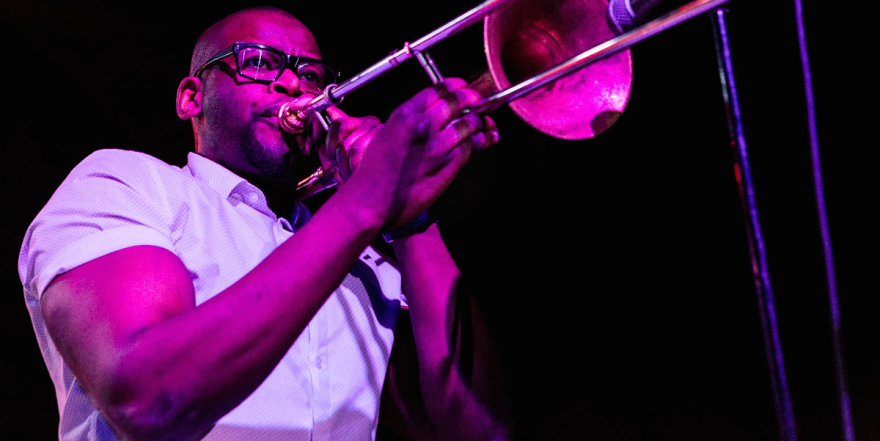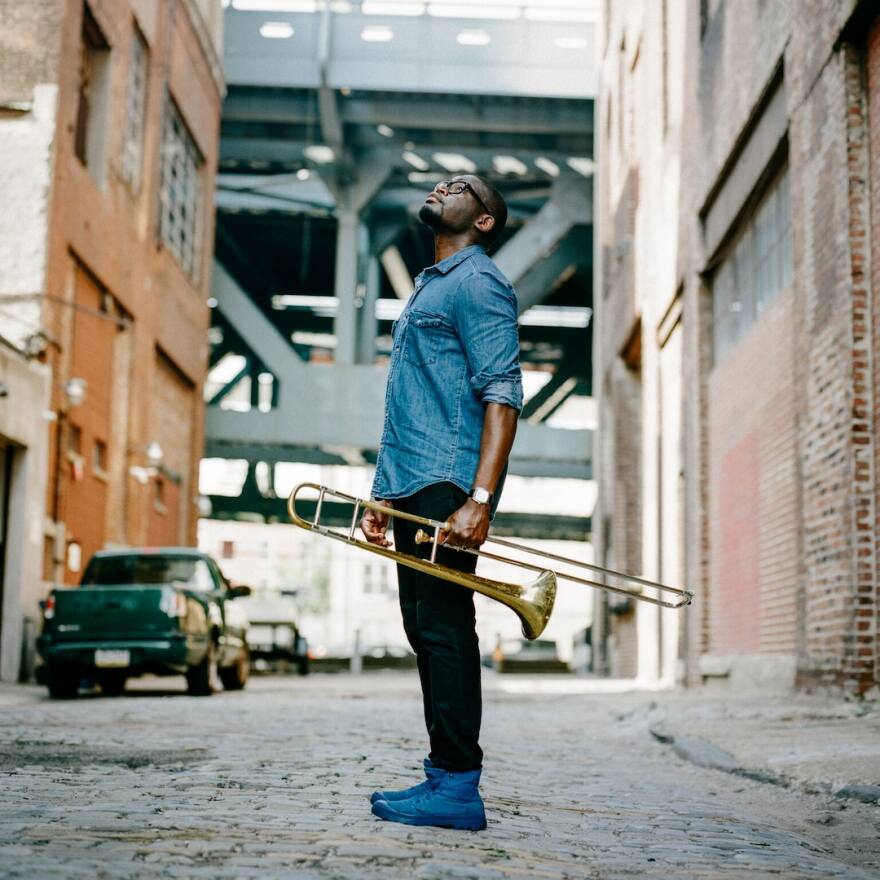When I first met Ernest Stuart in 2012, I was a 23-year old budding jazz blogger. I was writing about Philadelphia and he let me trail him for a brand-new jazz festival he'd started. It focused on local talent and acted more like pub crawl than a traditional festival. If you didn't like the band, you could walk a few blocks and check out another.
Stuart, then 28, was a successful jazz trombonist turned intrepid concert presenter. He rallied nearly 200 people to help him raise more than $17,000 to produce the inaugural Center City Jazz Festival: one day, 16 bands, and a handful of venues within walking distance, with one single access pass.
The first festival was a success, so Stuart kept it up every year. But while some festivals went virtual in 2020, he pressed pause. This year marks the return of Philly's favorite jazz marathon. And I'm now working at WRTI, the presenting sponsor of the festival, so what better reason to to catch up with my old buddy? Here's a lightly edited transcript.
There's a certain energy before a festival begins. What's that like for an artistic director?
It feels great. There are a lot of loose ends that need to be tied, of course. But there have been three years off. I feel happy to have this sort of chaos happening, that typically precedes an event like this. I feel lucky to be stressed, if that makes sense.

Yeah, I think people like you thrive in the deadline crunch.
Right? Exactly. I remember when I was in grad school, I got tired of waiting until the last minute to write papers and things like that. One time I said, 'Forget it. I'm just going to, you know, begin writing this paper as soon as I get the assignment.' And I did: I wrote it all, and a week before the assignment was due, I looked at what I had written and it was complete garbage. It was just terrible. I was just like, 'I perform better under pressure. All the creativity is squeezed out of me and, you know, it's just getting better.' So I like this position. It feels really nice.
There's a certain kind of artist that is that way. And you do straddle the world of right brain / left brain: artist creative, but also an organizer. What do you get most out of being an organizer and a kind of conduit for a community?
That's just it. I don't feel like I'm on top of everything, looking down. I feel like I'm just a conduit. I feel like I'm just here to help, you know, get these musicians in front of these people. And I think that's the most important thing that I could be doing right now, you know?
What do you say right now? The festival has kind of taken a hiatus, and this'll be like the first time it comes back since Covid, right?
Yeah. I announced the ninth annual festival in March, 2020. You know, perfect timing. I had a partial lineup and all of that. And ultimately it just fell apart, because of the pandemic. I had to cancel everything. So I didn't know that it would ever come back. In fact, in January of this year, the festival wasn't happening. So this all came together very quickly with the help of WRTI, Jazz Philadelphia, Turtle Studios, PECO.
So what lessons do you think you're bringing that you might have learned over the years?
I managed to get a masters in nonprofit management during the pandemic. I wasn't touring. I had nothing better to tackle, so I got a masters, and it sort of strengthened my resolve to use the resources at hand to accomplish a big goal. Sort of sitting down and planting seeds to say, 'Look, we can do this, but it's gonna take all of us.' And, you know, in the past, I've sort of shouldered the burden on my own. Which is why I'm incredibly happy that I've been able to work with some people, and it's almost a sign of things to come like it could be greater if there's multiple sources of help and ideas pouring into this thing. It's also great to reconnect with a lot of people that I was seeing yearly at the same time. Shaun Brady is one of those people; he interviewed me for the very first festival and for subsequent festivals. You sort of get to build a nice rapport with people, and the festival has all of these weird ancillary benefits that I really missed. And I didn't realize I missed them until they came back, and I was like, 'Oh yeah, this is nice.'

This is good news in the city of Philadelphia. This is something that brings people joy and that's a real antidote in this time we live in. Another person that interviewed you during that first festival was myself, when I was an aspiring blogger. That was 2012, right?
Yeah, that was the first one. 2012. Yeah. Absolutely. And you've gone on to do some really incredible things. Ain't about me, but it is a great feeling to have been there.
I have memories of seeing Wade Dean. He left such an impression on me. I might have been 20 years old at that time, or 22. I thought, 'This man has such passion for his instrument and he's so approachable.'
Right.
And the way the festival is structured, it's so intimate. I remember being at Fergie's Pub, seeing him play and just saying hello.
Yeah.
I remember the vibe at the time — everyone shoulder to shoulder. And these are impressions that stick with you. So could you take me back to that first festival? What role or void did it fill? What did the Philly scene need, and how did you fill it?
I think Ortlieb's had closed the year before. You know, Zanzibar Blue had closed. We were losing venues. And at the same time, there was a larger jazz festival in Philadelphia that sort of, on the main stage they featured non-jazz acts and put the jazz in sort of the margins. It left a bad impression. I thought that these are the people who need the love and the light more than anyone else. We need to take care of our local musicians. So I endeavored to sort of make a festival that was big enough. I felt that it only needed to be big enough to support our local artists, and if I can draw in a person here or there from the broader region, then great. And, you know, the first festival did exactly that. I didn't know if it would be a yearly occurrence.
Mmhmm.
But as it kept going and the feedback grew increasingly positive, I thought that, 'OK, this could be something,' you know. But it's funny, I think at the time what I was hoping for more than anything was to inspire other artists to think more locally and think about how they can change things in town. Because Philadelphia is one of those cities that you can see something that you want to change and didn't change it. Or if you see something you want to build, then build it. You know, you can create a theme and really impact things. I suppose this is a long answer to your question. But I definitely wanted to showcase our Philadelphia talent. But I also wanted to show that if a regular musician can create something, then any one of you could, could do it, too.
And have you been a sounding board for younger artists who have wanted to be more entrepreneurial? Have you seen that?
I've had conversations with younger artists, and they pick your brain. They want to know what you know, and they say like, 'What about this? What about that?' How, you know? And I love that. That's exactly how I was, you know? I try to give anyone access to me. Throughout this process, I've learned a lot. I've made lots of mistakes and I've also made a lot of relationships. If there's anything I could do to help people forward their ambitions or endeavors, I'm more than happy to do so.

Was there somebody that you looked back to, over a decade ago, as a role model?
Well, you know, it's funny. So the first event I ever created was a Monday night event at a Thai restaurant. And I used Monday night because it was the only night they didn't have music, and the restaurant was closed. And I said, 'Hey, give me your Monday night. Open the restaurant and I'm going to put something in here.' And that turned into this crazy event that was just lifted for years and people would be on tour — you know, like Jason Mraz came one time with his band because they had just played the arena in Camden and came over to our little room, you know?
I love that.
Yeah, it was great. From that, I gained a little bit of confidence to say, you know, 'Maybe this is something I could pull off,' you know? But I have friends whose opinions I trust, and I use them as sort of a sounding board whenever I have a weird idea. So to answer your question, it's not that I had someone older than I was looking to, I just had my peers around me that I trust. It's been great. And even with booking ideas, this festival is very unique in that it is truly a local festival. I get to talk to musicians, and they're always talking to me about other people. I've never responded to an email from people wanting to perform. That's like my dirty little secret, I guess. It's a very active process, you know, booking this thing and hearing what other people have to say.
So what is the future of the festival? Without giving too much away, I know this is a little bit of a launchpad for something new and larger in Philadelphia.
The goal is always to increase the impact of the jazz scene and really try to move in a direction that'll be more inclusive to other spaces, for more people to enjoy the festival, and most importantly the music. So we're going to be working together with a couple organizations to create a larger festival for Philadelphia.
As a recent resident here, I think about what it would feel like for a Philly jazz festival to expand beyond the center city limits.
The thing I love about this festival, the Center City Jazz Festival, is that it is walkable. You get a wristband and you walk from venue to venue, but also it means that any venue that's not within that corridor doesn't fit. So the idea is to sort of maintain that a bit, but begin to expand so that you can be inclusive to all these other wonderful spaces. You know, like you mentioned, there's lots of opportunities out there to bring in some other venues and performance opportunities.
Awesome. Well, good luck this weekend.
Thank you. I'm just gonna hold my breath the entire time. You know, one thing I love about it is that once the first note is played at the first venue, it's all downhill from here. You know, you just have to sort of allow it to happen, and kind of get out the way, put out any small fires that might pop up. But it's a great feeling.
The Center City Jazz Festival runs through April 23. For more information, visit ccjazzfest.com.

